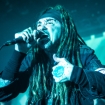"We wanted to make sure that if we returned, we wouldn't be like every other boring, predictable band that gets back together after 10 years or so," says Godflesh singer-guitarist Justin Broadrick, sitting in his home studio in Wales. "We wanted to do something that would grab people by the throat and shake them. It had to be aggressive and ugly or there was no point."
A World Lit Only by Fire, Godflesh's first full-length since 2001's Hymns, more than lives up to Broadrick's billing. Instead of using real drums, as they did on their last two studio albums, Godflesh have returned to primitive drum-machine beats that the group's two human members, Broadrick and bassist G.C. Green, accompany with down-tuned riffs, unsettling samples, queasy guitar harmonics, and a mix of punkish shouts and echoey half-chants. It's the kind of caustic songcraft Godflesh dropped like a bomb in the late '80s and early '90s with classic albums such as Streetcleaner and Pure, which would influence bands ranging from Korn and Fear Factory to ISIS and Converge.
For anyone who thought parenthood had calmed Broadrick, that he would be forever sated and sedated by Jesu—the ethereal post-rock outfit that has dominated his world for the past decade—A World Lit Only by Fire is evidence of the contrary. Broadrick needs Godflesh back in his life even more than the group's biggest fans do.
"There's so much going on in the world that's terrifying and infuriates me," he says. "And it scares me even more now that I'm bringing my son up in this environment. Once I started doing Godflesh again, I quickly realized that this kind of music allows me to cope with all the insanity. It's therapy. It's physically and spiritually ingrained in my soul to the point that it feels entirely necessary. I pushed it away for a long time, but now I realize that I need it like I need air."
Broadrick's current commitment to Godflesh is evident from the time and care he put into bringing the band back to life. Instead of leaping right back into the fire, he spent the better part of four years working on a solid batch of songs true to the group's formative vision.
"I wanted to get back to the roots of the band's sound, which is when we were at our grittiest and you could almost smell the urban decay," Broadrick says. "I wanted to get the filth and the factory smells into the music."
Godflesh's gritty, claustrophobic sound is deeply rooted in the history of its members, who both grew up in a dilapidated council estate in Birmingham listening to British punk, post-punk, early industrial, and metal. "I literally met Ben on the street outside the flat I lived in," Broadrick says. "I used to hang out in my primitive punk clothes hoping to communicate with other kids and I'd usually end up getting bullied by the local football hooligans. One day, Ben walked by looking rather punky. We exchanged a knowing glance, like we were of the same tribe."
In 1983, Green invited Broadrick to join his post-punk band Fall of Because. Named after a Killing Joke song, the group broke up in 1986, morphing into Godflesh by 1988. Between came Napalm Death. The grindcore pioneers' original vocalist, Nicholas Bullen, invited Broadrick to join the band, and he contributed to three Napalm demos and the first 12 songs of their legendary debut, Scum, before the other members fired him for being a "noisy bastard." Broadrick says that one reason he wanted to go in a slower, sludgier direction with Godflesh is because he was tired of the insanely fast music, like Napalm Death's, that was dominating the underground metal scene.
Inspired by the digital beats of Run DMC and Public Enemy, he convinced Green not to hire a drummer and to use a machine instead. The two borrowed money from Green's mom, bought a machine and programmed it to the slowest speeds possible.
"I had this fantasy about making music at the wrong speed," Broadrick says. "We started tuning the guitar down until it was unplayable, then we'd bring it back up until it was barely playable. I applied the same principle to my voice."
In addition to being inspired by Throbbing Gristle, Joy Division, the Swans, and early Celtic Frost, Broadrick and Green were also creatively motivated by hallucinogens; the name of the band came from a drug dictionary that defined "Peyote" as "god's flesh."
"We couldn't get peyote, but we did loads of acid and shrooms, and we had our share of death trips, which we'd try to recreate, musically and lyrically," Broadrick says. "Those trips were fundamental to the ugly, psychedelic sounds we wanted to make. We'd do acid and watch movies like Altered States [an image from which adorns the cover of Streetcleaner], Eraserhead, and Texas Chainsaw Massacre, with our noses inches from the screen."
After tripping balls and watching Hellraiser, Broadrick became infatuated with the demonic voice of Pinhead. So he used a pitch shifter to make his vocals sound like they would "tear your soul apart." Godflesh released their self-titled debut EP in 1988 and then started booking gigs.
"The first ever show we played was in a really shitty dive in Brixton," Broadrick recalls. "When we started playing, people just sat down and politely headbanged."
Signed shortly thereafter to seminal metal label Earache Records, Godflesh often shared bills in the early '90s with label mates Napalm Death, Carcass, and Morbid Angel, and at first crowds couldn't understand why Godflesh used a drum machine and played so slowly. Some became indignant and threw things or spat on the band. But for everyone that hated Godflesh with malice, many others grew to love them obsessively.
With Godflesh's bigger profile came new opportunities. In 1993, Broadrick was asked to remix Pantera's "Fucking Hostile" and "Be Demons be Driven" for the band's Walk Biomechanical EP. He found the task "incredibly daunting," since these were his first remixes ever and, it being the early '90s, there was "no luxury of cut and paste and dealing with files," Broadrick explains. "This was real tape, reel to reels. I sampled nearly every part of each song I wanted to use and then used simplistic cut-up methods. Hard work." Broadrick says he was "happy-ish" with the results, and that Pantera were very complimentary about the remixes when he finally met them after a show in Birmingham.
"It appeared to me that Phil Anselmo was the only real Godflesh fan, but that the other guys appreciated what I did with their music," he says. "I recall Vinnie Paul saying, 'It's like real metal what you've done. At least, it's none of that dance crap!'"
In 1994, another great opportunity arose when Earache signed a merger deal with Columbia, which brought Godflesh to the label and offered them a sizable budget for their third album, Selfless. Columbia also gave them the thumbs up to hire acclaimed and controversial "Piss Christ" photographer Andreas Serrano to shoot the video for "Crush My Soul," which climaxed with a scene of cow's blood pouring all over Broadrick's face.
"When Serrano presented me with the idea, I thought, Well, if it looks as beautiful as his photography does, then I'm all for it," Broadrick recalls. "It was real blood and he flavored it with loads of sugar to make it a tad more palatable. It was suffocating. I had it in my nose and my mouth and we had to do several takes. I showered for three days solid, and I could not get every bit of that grimy blood of me. I can still smell it to this day. It's an odor that has never been permanently removed from my psyche."
In support of Selfless, Godflesh toured with Danzig and Type O Negative, and Glenn Danzig was so taken with the opening act that he decided to hire Broadrick as his new guitarist. "I only spoke to him a few times on that tour, but he told me he was a huge fan," Broadrick says. "I wasn't at all aware of him wanting me to join the band, but as soon as the tour ended, Glenn's manager told me what was up. I was a bit taken aback, but we arranged a phone call between me and Glenn. Mostly he talked about music and comics, but didn't say anything about me joining. I figured maybe there had been a mistake, then his manager phoned me back and said, 'What do you think?' I said, 'Well, Glenn really didn't ask me to join.' He said, 'He wants you to join.' I told him I couldn't because I was doing Godflesh and he got mad and started yelling at me."
Danzig wasn't the only rock star who took a shine to Godflesh. Faith More's Mike Patton hooked them up with new management, and when Godflesh went to San Francisco, Metallica guitarist Kirk Hammett invited them to visit his home. "We were pretty star struck," Broadrick admits. "We finally got up the courage to talk to him on the phone and he was lovely and expressed his huge love of the band that we weren't aware of at all. We went over to his house, which was a bit more than a house—more like half a street. We stayed with him for a number of days, doing drugs, talking music, and jamming. We showed him the video for 'Crush My Soul,' which he loved."
Two years later, Metallica used a piece of Serrano's artwork, titled "Semen and Blood III," as the cover of their album Load. This was no coincidence, according to Broadrick, who insists that no one in Metallica knew who Serrano was before Hammett saw the "Crush My Soul" video.
Having won fans among some of the biggest names in heavy music, Godflesh should have been riding high; instead, they were falling into disarray. Financially hamstrung by a one-sided record contract, Godflesh fought to get off of Earache, and when they were finally released no one wanted to sign them. They finally struck a deal with Koch Records, which seemed confused about how to market the band. The confusion was justified. Godflesh had lost direction, hiring drummer Ted Parsons (Swans, Prong), and crafting more accessible and ethereal songs for Hymns. Looking back, Broadrick says he had lost perspective over what was good and what wasn't. In 2001, two weeks before leaving for a European tour, Green called Broadrick and quit Godflesh. Frantic at having lost his bandmate of 18 years, Broadrick scrambled to find a replacement and at the 11th hour secured Paul Raven (Prong, Killing Joke).
"I literally went from having Ben leave the band to having Raven at my house working on songs," Broadrick says. "I had no time to absorb what had happened. We went out on tour and it all felt wrong. I was just not enjoying it anymore and it felt like I had hit a brick wall. I didn't want to do Godflesh anymore and I was surrounded by people who wanted it to keep going. I was drinking a bottle of Jack Daniels a night, lots of beer and anything, literally, to numb and nullify my existence on the road. I had to be off my face to perform, to have the passion for getting up onstage."
Godflesh booked a U.S. tour that was scheduled to launch two months after the European dates ended. During that period, Broadrick fell apart. He abused drugs and alcohol, mourned the absence of Green, and questioned his significance as an artist. Right before the tour was scheduled to begin, a friend drove to Broadrick's home in the countryside to pick him up and take him to an airport in London. That's when Broadrick, who hadn't slept for three days, suffered an emotional breakdown.
"I couldn't move my limbs to get out of bed," he says. "I wanted to run away. I couldn't confront anyone or talk to anyone and I told my friend I needed him to hide me somewhere. So he took me to a flat in Birmingham and I canceled everything. I couldn't sleep. People literally wanted to kill me. I ended up going to a doctor, who told me I was depressed and put me on a load fucking drugs, which leveled me out, but I had to pay for all the losses, including hiring the bus, the rented equipment, the loss of earnings from the agent. My ex-girlfriend couldn't deal with it, and it broke me in half, both financially and personally."
Twelve years have passed since Broadrick walked away from Godflesh. In the intervening time he remained a music obsessive and workaholic. In addition to recording five full-length records, three split albums, and seven EPs with Jesu, he has released ambient, industrial, electronic, and rock music with over a dozen projects including Final, Curse of the Golden Vampire, Council Estate Electronics, Pale Sketcher, Greymachine, and JK Flesh. When Broadrick decided in 2010 to start writing again for Godflesh, he had the luxury of working in fits and starts between raising his son and creating his other music and remixes for other bands.
By the time Broadrick started mixing A World Lit Only by Fire, he had so much material he decided to release four new tracks early and exclusively as the Decline & Fall EP, which is more brooding and less direct than the new full-length, but delivers its own disorienting punch.
"I thought it was a good idea to release the EP as a taste of what was to come," Broadrick says. "We could have been shooting ourselves in the foot, but the reaction was ridiculously positive."
With a new album and EP, and future tours in the works, Broadrick is excited that after four years of occasional shows and studio tinkering, Godflesh are once again on the front burner. During more placid moments, he'll continue to write and tour with Jesu, but for now he's most excited about keeping the Godflesh flame alight. "This has been such a positive experience and I can't wait to go back in my studio and write more material for Godflesh," he concludes. "I feel like this is a tremendous new beginning, a true rebirth, and there's way more to come."












